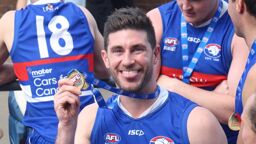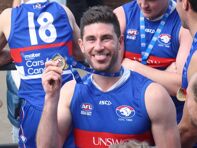The longest suspension for homophobic abuse in AFL history has been slapped on a teenage footballer.
A report in The West Australian says highly-rated forward Lance Collard allegedly directed the anti-gay slur “f****t” towards two opponents as many as 10 times while playing for Sandringham against Williamstown in the second-tier VFL Saturday.
As the 19-year-old is a registered top-tier AFL player — in his rookie season, he has made three senior appearances for his parent club St Kilda — he was subject to an investigation by the AFL Integrity Unit.
The punishment is a six-game ban, one game more than was imposed on Gold Coast Suns’ Wil Powell for a similar offence in May, and two more than Port Adelaide’s Jeremy Finlayson received the previous month.
Get off the sidelines and into the game
Our weekly newsletter is packed with everything from locker room chatter to pressing LGBTQ sports issues.
Related


Pro athlete gets ban for using anti-gay slur during match – this out gay athlete calls it ‘significant’ and ‘major step’
Jeremy Finlayson will sit three games after using an anti-gay slur. Michael O’Donnell, who plays in a lower league, applauds the decision.
By Jon Holmes | April 10, 2024
The AFL determined that Collard used “unprompted and highly offensive homophobic slurs” and stated that he had pleaded guilty.
In a club statement, the forward said he was “incredibly remorseful” and would “fully accept the consequences” for his behavior.
“What I did doesn’t represent my values, or the values of the club,” he added. “I have apologized to the Williamstown players who were impacted by my behaviour, and unreservedly reiterate that apology to anyone else my conduct affected.”
St Kilda’s general manager, David Misson, confirmed that the Pride Cup organization would deliver extra LGBTQ-inclusive education to not just Collard but also his teammates, “to ensure that this never happens again.”
In light of this being the third AFL player incident involving the “f****t” slur this season, and with North Melbourne coach Alastair Clarkson having also been fined for anti-gay language back in March, chief executive Andrew Dillon was asked if it showed the league has a homophobia problem.
“I don’t think we do but I think language of the type that has been used is not acceptable in any forum, let alone a footy field,” said Dillon.
“We will continue to sanction players, first of all educate players and then sanction players if they transgress.
“It’s something we want to continue to work on with the players and you’ll see sanctions increase until we don’t have it anymore.”
St Kilda's Lance Collard has received a six-match suspension for using homophobic slurs in a VFL match.
— AFL (@AFL) July 17, 2024
More details: https://t.co/M9oNrZHK74 pic.twitter.com/PoKL8Wt51U
Dillon’s view could be seen as aligning with a study published in Australia in 2019. Researcher Eric Denison and a team from Monash University surveyed over 300 16 to 20-year-old male rugby players.
Overwhelmingly, members of the group expressed the belief that a gay player would feel welcome on their team (83%); but they also revealed the prevalence of homophobic language in their sports environment, with 78% having heard anti-gay slurs used by teammates in the fortnight before they took the survey.
The escalation in reports of homophobic language in Australian men’s team sports this year suggests there is greater awareness from match officials and other players about the damage this abuse can cause.
Recently, the team captain of a pro rugby league team was punished for on-field slurs, while in May, an East Perth footballer was handed a three-game ban for discriminatory abuse of an opponent.
Increasingly, the onus is being put on senior leaders to implement more far-reaching education programs that could help to prevent gay and bi men drifting away from sports and lead to greater representation in the future.
Mike O’Donnell, who plays in an Aussie Rules league in the Sydney area and who is an out gay man, wrote on X that the AFL needs to “go a step further” after banning Collard.
Two days earlier, when news of the player’s offence broke, O’Donnell said it would contribute to young closeted players leaving the game: “It is now imperative that the AFL and clubs come together to let everyone know they ARE welcome.”
A mere suspension for homophobia – after four occurrences in just this season – no longer cuts it.
— Michael O'Donnell (@TheMikeOD) July 17, 2024
Players & coaches are employees of the AFL. If I ran around my workplace shouting homophobic or racist slurs, I’d lose my job.
It is now time for the AFL to go a step further. https://t.co/cjlG6YcSi0
The Collard incident occurred just over a week after the eighth annual Pride Game between his parent club St Kilda and the Sydney Swans.
St Kilda players wore rainbow socks, while their opponents wore a special edition jersey in a rainbow confetti design, as well as Progress Pride socks. The Swans also ran a ‘Take Pride in your language’ campaign on social media.
The AFL does not have a league-wide Pride round, in contrast to the women’s competition, the AFLW, and outside of that one Pride Game and the contributions made by LGBTQ supporter groups, visibility in the sport is limited.
On Instagram, inclusion advocate and longtime campaigner Angie Greene wrote on her Stand Up Events account wrote that homophobic language was “everywhere and often… things become reactionary instead of being proactive to do our best to eliminate this behavior.”
She added: “People working in this space have known what an issue the AFL culture has had forever … but now we have recorded public examples. Yet the issue is still being denied.”
The Collard case is further evidence that points to the AFL having a serious issue with players and coaches using homophobic language.
Does that equate to a wider homophobia problem? Dillon may disagree but for many observers, the perception is only getting harder to shift.








































